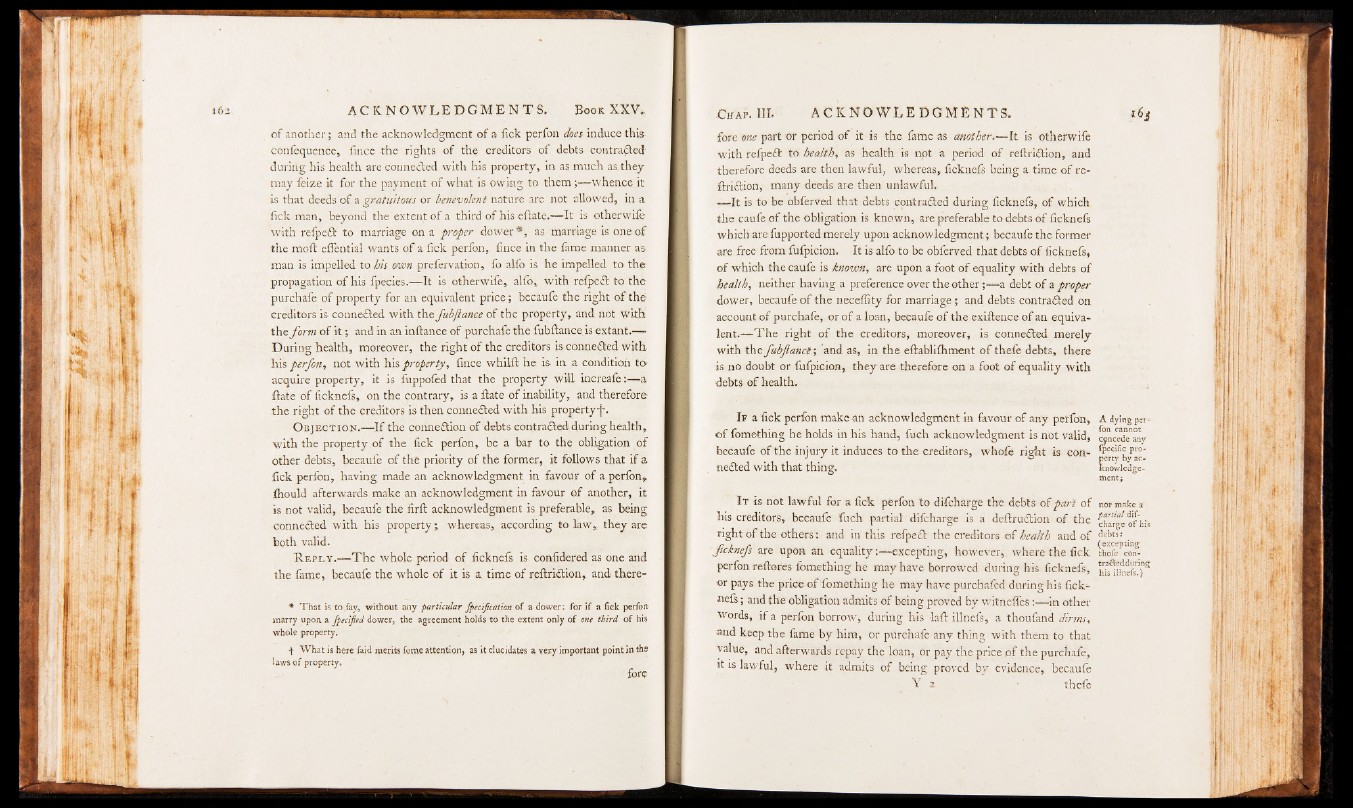
of another; and the acknowledgment of a fick perfon does induce this
confequence,. fince -the rights of the creditors of debts contracted
during his health are connected with bis property, in as much as.they
may feize it for the payment of what is owing to them;— whence it
is that deeds of a gratuitous or benevolent nature are not allowed, in a
fick man, beyond the extent of a third of his eftate.— It is otherwife
with relpeCt to marriage on a proper dower*, as marriage is one of
the moll eflential wants of a fick perfon, fince in the fame manner as
man is impelled to bis o/wn prefervation, fo alfo is he impelled to the
propagation of his fpecies.— It is otherwife, alio, with refpect to the
purchafe of property for an equivalent price; becaufe the right of the
creditors is connected with the fubjlanee of the property, and not with
the form of i t ; and in an inftance of purchafe the fuhftance is extant.—
During health, moreover, the right of the creditors is connected with
his perfon, not with his property, fince whilft he is in a condition to
acquire property, it is fuppofed that the property will kiereafe:— a
ftate of ficknefs, on the contrary, is a date of inability, and therefore
the right of the creditors is then connected with his property j-.
O b j e c t i o n .— I f the connexion of debts contracted during health,
with the property of the fick perfon, be a bar to the obligation of
other debts, becaufe of the priority of the former, it follows that if a
fick perfon, having made an acknowledgment in favour of a perfon,
ftiould afterwards make an acknowledgment in favour of another, it
is not valid, becaufe the firfl: acknowledgment is preferable, as being
connected with his property; whereas, according to k w , they are
both valid.
R e p l y .— T h e whole period of ficknefs is confidered as one and
the fame, becaufe the whole of it is a time of reftridtion, and there*
That is to.fay, without any particular fpecification of a dower: for if a fick perfon
marry upon a fpecified dower, the agreement holds to the extent only of one third of his
whole property.
t What is here faid merits fome attention, as it elucidates a very important point in the
laws of property.
fore
fore one part or period of it is the fame as another.— It is otherwife
with refpeCt to health, as health is not a period of reftriction, and
therefore deeds are then lawful, whereas, ficknefs being a time o f reft
riction, many deeds are then unlawful.
— It is to be obferved that debts contracted during ficknefs, of which
the caufe of the obligation is known, are preferable to debts of ficknefs
which are fupported merely upon acknowledgment; becaufe the former
are free from fufpicion. It is alfo to be obferved that debts of ficknefs,
o f which the caufe is known, are upon a foot of equality with debts of
health, neither having a preference over the other ;— a debt of a proper
dower, becaufe of the neceffity for marriage; and debts contracted on
account o f purchafe, or of a loan, becaufe of the exiftence of an equivalent.—
T h e right of the creditors, moreover, is connected merely
with the fubftancf, and as, in the eftablifhment of thefe debts, there
is no doubt or fufpicion, they are therefore on a foot of equality with
debts of health.
If a fick perfon make an acknowledgment in favour of any perfon,
o f fomething he holds in his hand, fuch acknowledgment is not valid,
becaufe of the injury it induces to the creditors, wfaofe right is connected
with that thing.
A dying perfon
cannot
concede any
Ipecific property
by acknowledgement;
It is not lawful for a fick perfon to difeharge the debts of part of
his creditors, becaufe fuch partial difeharge is a dcftruCtion of the
right of the others;, and in this refpeCt the creditors of health and of
ficknefs are upon an equal i tyexcept ing, however, where the fick
perfon reftores fomething he may have borrowed during his ficknefs,
nr pays the price of fomething he may have purchafed during his ficknefs
; and the obligation admits of being proved by witneffes:— in other
words, if a perfon borrow, during his laft illnefs, a thoufand dirms,
and keep the fame by him, or purchafe any thing with them to that
value, and afterwards repay the loan, or pay the price pf the purchafe,
it is lawful, where it admits of being proved by evidence, becaufe
Y 2 ■ thefe
nor make a
partial difeharge
o f his
debts:
(excepting
thofe con-
tra&edduring
his illnefs.)